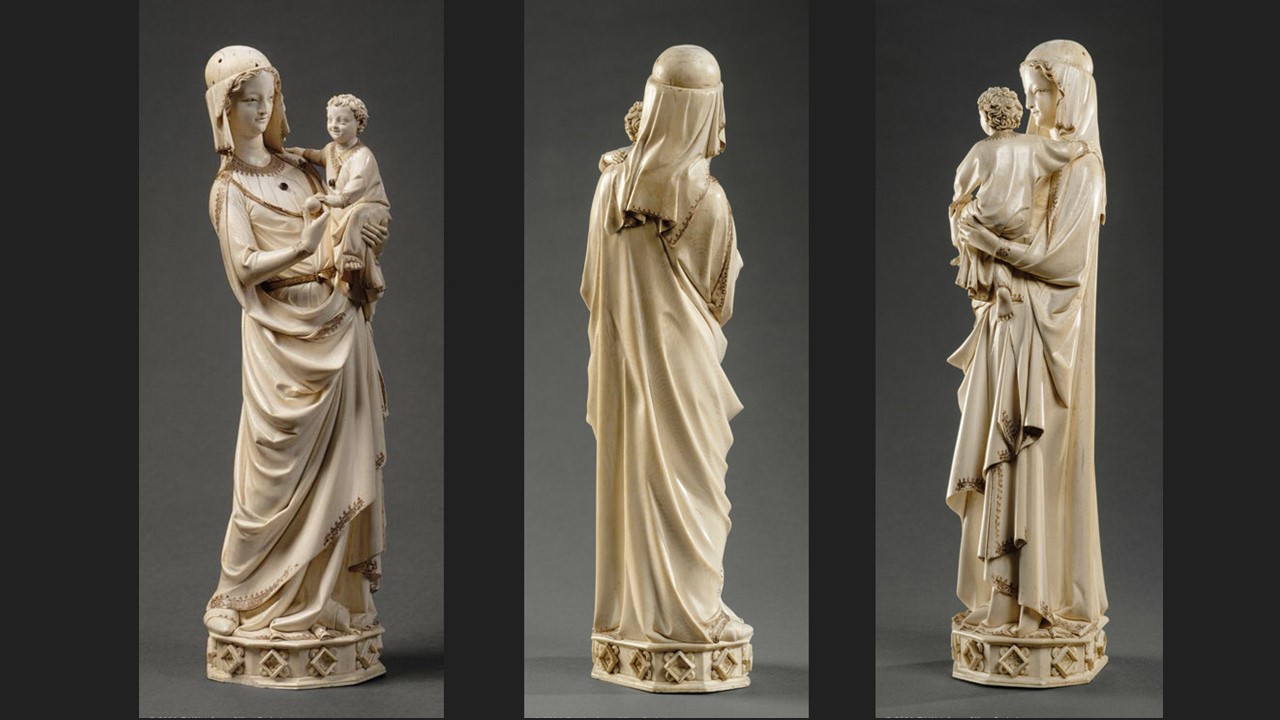What curve, what contrapposto, shift of weight,
Recalls the tusk from which some Gothic hand
Had carved the Paris Virgin holding straight
My King enthroned upon an ivory stand!
What smiles, no longer earthly, but divine,
And each the mirror of the other’s joy!
What tenderness contained within a line!
What holy innocence without alloy!
Is my heart harder than the narwhal’s horn,
The walrus-tooth from out a distant sea?
O thou, who tamed the mystic unicorn,
Transforming Beauty, make me like to thee!
That I may perish like that elephant,
But leave, to sound thy praise, this oliphant!
from Sonnets for Heaven’s Queen
Joseph Charles MacKenzie is a traditional lyric poet of New Mexico. On February 1, 2020, he won the Society of Classical Poets Competition, taking First Place in the Best of 2019 category. He is also the only American to have won the Scottish International Poetry Competition (see: Times Literary Supplement, Jan 27, 2017). A Pushcart Prize nominee, MacKenzie’s verses have appeared in The New York Times, The Scotsman (Edinburgh), The Independent (London), The Telegraph (London), and many other venues. He wirtes primarily for Trinacria (New York) and the Society of Classical Poets (New York).















A wonderful poem, indeed, but extra special to me as once an elephant was my best friend. Thank you!
Dear Mr. Zoutewelle,
You have said something so very intriguing! I do hope you will gift us with your story.
All good wishes!
Dear Mr. MacKenzie,
I would be happy to try if you will suggest how I should go about it.
Kind regards,
Leo
Lovely in more ways than I can explain.
After all, to offer God our very self so that we can be remade into something even more beautiful and useful for God’s kingdom is, indeed, what we were created for in the first place!
And for you and me and all of us together to be mirrors of the Holy Family’s joy?–It is the very heart of the gospel! “These things I have spoken to you, that my joy may be in you, and that your joy may be full.” John 15:11.
Jesus’ words are more sublime than any we could pen, of course, but if an inspired seraph engaged eternity by writing a 21st-century sonnet in English, I suspect it would not be unlike this one.
Dear Mr. Tweedie,
I place at the feet of Our Lady your profound act of devotion to her divine Son, as it is only her beauty which has inspired your very kind words.
Pax et bonum!
Joseph
Turris eburnea — one of the beautiful titular names for the Blessed Virgin Mary.
Yes, Dr. Salemi, this is the only title of the Litany that directly celebrates Mary’s pulchritude. In my work in progress, “Sonnets for Heaven’s Queen,” the sequel to “Sonnets for Christ the King,” you will find one sonnet for each of the Blessed Virgin’s 50 titles, followed by 27 other sonnets, including two coronae.
“Turis Eburnea,” or “Tower of Ivory,” Our Lady’s 29th title, immediately follows that of “Turis Davidica” which draws from her power and strength as a kind of fortress of protection surrounding her divine Son. The scriptural foundation of “Ivory Tower” is to be found in the Canticle of Canticles: “Thy neck is as a tower of ivory.” In the neck, of course, the Father and Doctors understood a metaphor for Mary’s role in the economy of grace: Just as it is through the neck that the head directs the entire body, so through Mary God imparts His divine grace to Christ’s Mystical Body, which is the Church.
It was not unusual for me to spend an hour at a time admiring the Vierge à l’Enfant in the Louvre—something a guard told me he well understood.
The statue is also a holy relic having been placed not far from the Holy Crown of Thorns in La Sainte-Chapelle by Saint Louis IX himself, who commissioned an anonymous “ivoirier” of Paris to create a statue worthy of so exalted a subject, as we know from a certain First Inventory (prior to 1279) of the treasures of La Sainte-Chapelle. This was at a time when ivory had very briefly become more readily available to the artists of Paris, then the very capital of virtuoso ivory craftsmanship thanks to the trade routes opened by the Crusades.
The statue, including its headgear, was originally quite colorfully painted to represent the typical couture of the aristocratic ladies of Paris of that time, making it easier for them identify with Mary and thus imitate her virtues.
In the 14th century, Charles X had given the statue a gorgeous pedestal of orfèvrerie along with a precious emerald necklace, both of which were stolen during the Revolution. The 13th century was a high-point of Marian devotion throughout France.
This sonnet was very evocative, mysterious, and as James noted, these impressions are hard to explain. If you can believe it, the brother of a friend of mine was killed by an elephant up in Maine. There were no witnesses, and it has been theorized that the man suffered a heart attack (or something) and the elephant tried to revive him with its foot, thus crushing his rib cage. The two were quite fond of each other.
Yes, Mr. Anderson, this is the same impression one has when standing before La Vierge à l’Enfant. She is, indeed, evocative and mysterious—utterly unique, like the Blessed Virgin herself.
The statue became the model for all the others produced from that moment on to the end of the Gothic.